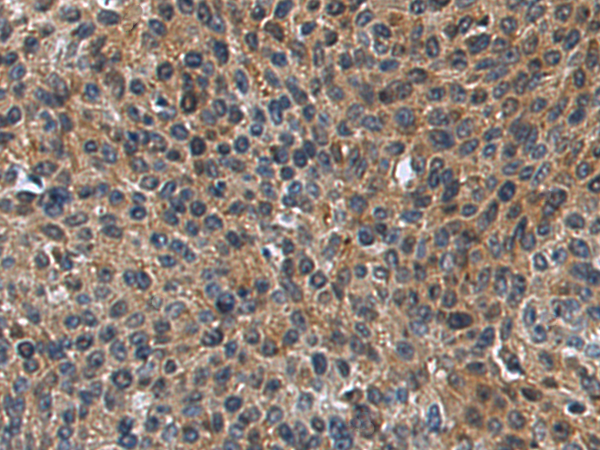
| WB | 咨询技术 | Human,Mouse,Rat |
| IF | 咨询技术 | Human,Mouse,Rat |
| IHC | 1/100-1/200 | Human,Mouse,Rat |
| ICC | 技术咨询 | Human,Mouse,Rat |
| FCM | 咨询技术 | Human,Mouse,Rat |
| Elisa | 1/5000-1/10000 | Human,Mouse,Rat |
| Aliases | CLCR; ELA4 |
| Host/Isotype | Rabbit IgG |
| Antibody Type | Primary antibody |
| Storage | Store at 4°C short term. Aliquot and store at -20°C long term. Avoid freeze/thaw cycles. |
| Species Reactivity | Human |
| Immunogen | Fusion protein of human CTRC |
| Formulation | Purified antibody in PBS with 0.05% sodium azide and 50% glycerol. |
+ +
以下是3篇与CTRC抗体相关的研究文献摘要,供参考:
1. **《Autoantibodies Against the Pancreatic Zymogen Granule Membrane Glycoprotein 2 (GP2) in Patients with Chronic Pancreatitis》**
- 作者:Löhr JM, et al.
- 摘要:研究分析了慢性胰腺炎患者中针对胰腺酶原颗粒膜蛋白(包括CTRC)的自身抗体,发现CTRC抗体与疾病进展和胰腺外分泌功能障碍相关,提示其可能作为诊断标志物。
2. **《Chymotrypsin C (CTRC) Antibodies as a Novel Biomarker in Autoimmune Pancreatitis》**
- 作者:Hart PA, Zen Y, & Shimosegawa T.
- 摘要:探讨CTRC抗体在自身免疫性胰腺炎(AIP)诊断中的应用,发现其与IgG4阳性亚型相关,且特异性高于传统标志物,可能用于区分AIP与其他胰腺疾病。
3. **《Proteolytic Activity and Autoantibody Profiles in Pancreatic Diseases》**
- 作者:Rosendahl J, et al.
- 摘要:通过分析胰腺疾病患者血清,发现CTRC抗体与遗传性胰腺炎及特发性慢性胰腺炎显著相关,提示CTRC自身免疫反应可能参与胰腺炎病理机制。
注:以上文献为示例性内容,实际研究中建议通过PubMed或Google Scholar以关键词“CTRC antibody”、“chronic pancreatitis autoantibodies”等检索最新论文,并核实具体研究数据。
CTRC (Chymotrypsin C) is a serine protease encoded by the CTRC gene, primarily synthesized in the pancreas. It plays a critical role in digestive enzyme regulation by activating and inactivating zymogens (inactive enzyme precursors) such as trypsinogen, chymotrypsinogen, and procarboxypeptidase. CTRC ensures proper digestion by preventing premature enzyme activation within pancreatic cells, which could lead to autodigestion and tissue damage. Mutations in the CTRC gene are associated with chronic pancreatitis, as impaired CTRC function disrupts trypsin regulation, promoting inflammation and fibrosis.
CTRC antibodies are essential tools for studying this enzyme’s expression, localization, and function in both physiological and pathological contexts. In research, they help elucidate CTRC’s role in pancreatic diseases, including its interaction with other proteases and inhibitors. Clinically, these antibodies aid in diagnosing pancreatitis-linked genetic variants or quantifying CTRC levels in biological samples. Additionally, they contribute to therapeutic development, such as targeting protease pathways in pancreatitis or pancreatic cancer. Recent studies also explore CTRC’s broader roles beyond digestion, including immune modulation and tissue remodeling. However, challenges remain in standardizing antibody specificity and sensitivity for diverse applications. Advances in monoclonal antibody technology continue to enhance CTRC-related diagnostics and research precision.
×